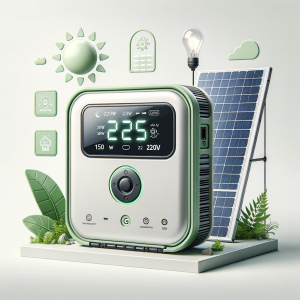
In Nigeria, the quest for reliable energy is often overshadowed by diesel and petrol generators' harmful environmental and health impacts. These generators are standard, filling the air with noxious fumes, especially when people return from work at night. The situation worsens as offices rely on these generators, leading to almost 24-hour exposure to polluted air, compounded by emissions from vehicles in traffic jams.
The Solar Alternative
Enter solar power, a cleaner, more sustainable energy source. Solar panels offer an eco-friendly alternative to the prevalent generators. By harnessing the sun's energy, they provide a solution that emits no pollutants, safeguarding the environment and public health.Case Study: Simply Solar 150W Portable Generator
A prime example of this solution in Nigeria is the Simply Solar 150W Portable Generator. This device is ideal for Nigerian homes, remote workers, and individuals frequently facing power cuts. It includes a solar panel, powers essentials like standing fans, and has additional benefits such as 4 DC bulbs and an AC output.Benefits of Solar Power
- Environmental Impact: Solar panels significantly reduce air pollution. Unlike generators, they don't emit harmful gases, thus contributing to cleaner air and a healthier environment.
- Health Benefits: Reducing reliance on generators means less exposure to toxic fumes, resulting in better respiratory health for the community.
- Renewable Energy Source: Unlike fossil fuels, solar energy is sustainable and inexhaustible.
- Reduced Noise Pollution: Solar panels operate silently, in contrast to the loud noise from generators.
Limitations in the Nigerian Context
- Initial Costs: The upfront cost of solar panels, like the Simply Solar 150W Portable Generator, can be high for many Nigerian households.
- Energy Storage: Solar energy is intermittent. Witht is not a reliable sole power source out efficient storage systems.
- Maintenance and Durability: While solar panels generally require low maintenance, the cost and availability of repairs can be challenging.

